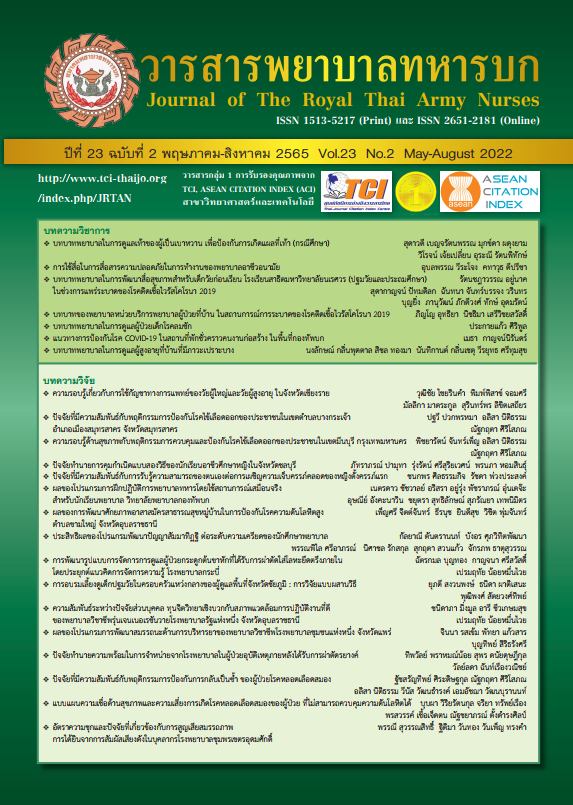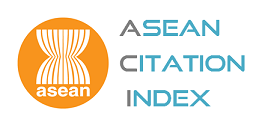ผลของโปรแกรมการฝึกหัดการรู้คิดต่อหน้าที่บริหารจัดการของสมอง และความจำใช้งานในครูเขตพัฒนาพิเศษภาคตะวันออก
คำสำคัญ:
โปรแกรมการฝึกหัดการรู้คิด, หน้าที่บริหารจัดการของสมอง, ความจำใช้งาน, ครูเขตพัฒนาพิเศษภาคตะวันออก (อีอีซี)บทคัดย่อ
การวิจัยครั้งนี้มีวัตถุประสงค์เพื่อศึกษาผลของโปรแกรมการฝึกการรู้คิดเพื่อเพิ่มสมรรถนะหน้าที่บริหารจัดการของสมอง และความจำใช้งาน กลุ่มตัวอย่างเป็นครูในเขตพัฒนาพิเศษภาคตะวันออก จำนวน 60 คน สุ่มแบบจับคู่คะแนน เป็นกลุ่มทดลองและ กลุ่มควบคุม กลุ่มละ 30 คน เครื่องมือวิจัย ได้แก่ 1) มาตรวัดหน้าที่บริหารจัดการของสมองสำหรับผู้ใหญ่-ฉบับภาษาไทย 2) การ ทดสอบการเรียงลำดับตัวเลข และตัวอักษร และ3) โปรแกรมการฝึกการรู้คิดเพื่อเพิ่มสมรรถนะหน้าที่บริหารจัดการของสมองและ ความจำใช้งานสำหรับครูในเขตพัฒนาพิเศษภาคตะวันออกที่ผู้วิจัยพัฒนาขึ้นโดยบูรณาการแนวคิดของการยอมรับและพันธะสัญญา โปรแกรมภาษาประสาทสัมผัส การฝึกสติแบบเพ่งความสนใจจดจ่อและการฝึกหัดการรู้คิด กลุ่มทดลองได้รับโปรแกรมฯ จำนวน 8 ครั้ง ๆ ละ 90 นาที แบบมาราธอน จำนวน 2 วัน ส่วนกลุ่มควบคุมได้รับคลิปวีดีโอความรู้วิธีการเสริมสร้างหน้าที่บริหารจัดการของ สมองและความจำใช้งาน ความยาว 12 นาที ที่ผู้วิจัยพัฒนาขึ้น กลุ่มตัวอย่างได้รับการประเมินหน้าที่บริหารจัดการของสมองและ ความจำใช้งานก่อนทดลองและหลังทดลอง วิเคราะห์ข้อมูลด้วยวิธีการวิเคราะห์ค่าที
ผลการวิจัย พบว่า ครูกลุ่มทดลองที่ได้รับโปรแกรมการฝึกการรู้คิดมีหน้าที่บริหารจัดการของสมองและความจำใช้งาน หลังทดลองดีกว่าก่อนทดลอง และดีกว่าครูกลุ่มควบคุม อย่างมีนัยสำคัญทางสถิติที่ระดับ .05
Downloads
เอกสารอ้างอิง
Haenjohn, J. Cognitive psychology (3th ed). Bangkok, Grandpoint, 2021. (In Thai)
Diamond, A., & Ling, D. S. Review of the evidence on, and fundamental questions about, efforts to improve executive functions, including working memory. In J. M. Novick, M. F. Bunting, M. R. Dougherty, & R. W. Engle (Eds.), Cognitive and working memory training: Perspectives from psychology, neuroscience, and human development, 2020: 143–431, Oxford University Press.
Baddeley, A. D. Working memory: theories, models, and controversies. Annu Rev Psychol, 2012; 63: 1-29.
Becker, L., & Rohleder, N. Time course of the physiological stress response to an acute stressor and its associations with the primacy and recency effect of the serial position curve. Plos one, 2019; 14(5): 1-15.
Minear, M., & Shah, P. Sources of working memory deficits in children and possibilities for remediation. In S. Pickering (Ed.), Working memory and education (274-307). Oxford, UK: Elsevier Press, 2006.
Svanberg, G., Munck, I., & Levander, M. Acceptance and commitment therapy for clients institutionalized for severe substanceuse disorder: a pilot study. Substance abuse and rehabilitation, 2017; 8: 45–51. https://doi.org/10.2147/SAR.S132255.
Enoch, M. & Dixon, M. The Use of a Child-Based Acceptance and Commitment Therapy Curriculum to Increase Attention. Child & Family Behavior Therapy, 2017; 39: 1-25.
Abbasi, M., Khazan, K., Pirani, Z., & Ghasemi Jobaneh, R. Effectiveness of treatment based on acceptance and commitment on cognitive-emotional functions of veterans. Iranian Journal of War and Public Health, 2016; 8(4): 203-8.
Baghani, Z. N., & Akbari, H. Investigating the effect of ACT training on self-efficacy and impulse control of addicts. Journal of Advanced Pharmacy Education & Research, Jan-Mar, 2020;10(S1): 77-88.
Nien, J. & Wu, C., Yang, K., Cho, Y., Chu, C., Chang, Y. & Zhou, C. Mindfulness Training Enhances Endurance Performance and Executive Functions in Athletes: An Event-Related Potential Study. Neural Plasticity, 2020: 1-12.
Haenjohn, J.A development of mindfulness based working memory training program of undergraduate students. Burapha University, Chonburi, 2019. (in Thai).
Song, X., Zheng, M., Zhao, H., Yang, T., Ge, X., Li, H. & Lou, T. Effects of a Four-Day Mindfulness Intervention on Teachers’ Stress and Affect: A Pilot Study in Eastern China. Frontiers in Psychology, 2020: 11, 1-9.
Grensman, A., Acharya, B. D., Wändell, P., Nilsson, G. H., Falkenberg, T., Örjan Sundin, O. & Werner, S. Effect of traditional yoga, mindfulness–based cognitive therapy, and cognitive behavioral therapy, on health related quality of life: a randomized controlled trial on patients on sick leave because of burnout. BMC Complementary and Alternative Medicine, 2018;18: 80-92.
Quach, D., Mano, K. E. J., & Alexander, K. A Randomized controlled trial examining the effect of mindfulness meditation on working memory capacity in adolescents. Adolescent Health, 2015: 1-8.
Choti P, Haenjohn, J., & Supwirapakorn, W. The Effects of Neuro-Linguistic Programming on Inhibitory Controls to Lose Weight in Overweight Policemen, Journal of The Royal Thai Army Nurses 2021; 22(2): 337-45. (In Thai)
Panyencheun, W., Haenjohn, J. & Sirithadakunlaphat, S. Development of program to promote attention based on Neuro-Linguistic Programming in primary school students. Journal of The Royal Thai Army Nurses. 2019; 20(3): 305-312. (in Thai)
HemmatiMaslakpak, M., Farhadi, M. & Fereidoni, J. The effect of neuro-linguistic programming on occupational stress in critical care nurses. Iranian journal of nursing and midwifery research. 2016; 21(1): 38-44.
Netrnilweerachot, D., Haenjohn, J. & Sirithadakunlaphat, S. The Effects of Storytelling based on the Royal Guidance of King Rama IX Program on Executive Functions of the Brain in Early Childhood. Journal of Educational Measurement Mahasarakham University. 2016; 24(2): 62-79. (In Thai)
Pahirun, P., Haenjohn, J. & Sirithadakunlaphat, S. The Effects of Brain Mind and Learning Training Program on Executive Functions of the Brain of Primary School Students. Ratchaphruek Journal. 2018; 16(3): 74-80. (In Thai)
Haenjohn, J., Sirithadakunlaphat, S., & Supwirapakorn, W. Development of training on promoting executive functions of the brain in adolescent, Journal of The Royal Thai Army Nurses 2018; 19(2): 220-229. (In Thai)
Anumat, P. Haenjohn, J., & Supwirapakorn, W. The Effects of Working Memory Training Program on Senior High School Students. Ratchaphruek Journal. 2018; 24(2): 143-152. (In Thai)
Haenjohn, J. A development of mindfulness based working memory training program of undergraduate students. Burapha University, Chonburi, 2019. (in Thai).
Friedman-Krauss, A. H., Raver, C. C., Neuspiel, J. M., & Kinsel, J. Child behavior problems, teacher executive functions, and teacher stress in head start classrooms. Early Education and Development, 2014; 25(5): 681–702.
Roth, R.M., Isquith, P.K. and Gioia, G.A. BRIEF—A: Behavior Rating Inventory of Executive Function— Adult Version. Psychological Assessment Resources, Lutz, FL, 2006.
Corey, G. Theory and practice ofgroup counseling (8th ed). Belmont, CA: Thomson Brooks/ Cole, 2012.
Kumlerd, S., Haenjohn, J., & Sirithadakunlaphat Development of Problem Solving Training Program Based on Acceptance and Commitment Therapy in Adolescents and Young Adults with Amphetamine Addiction. Journal of the Royal Thai Army Nurses. 2019; 20(1): 181-187. (in Thai).
Haenjohn, J. A development of executive functions of the brain of adolescent by integrative learning modules. Journal of Faculty of Education, Burapha Universtiy, 2017; 28(2): 130-44. (In Thai).
Nusonthara C, Haenjohn J, Sirithadakunlaphat S. A Development of Cognitive Flexibility Program Based on Acceptance and Commitment Therapy in Primary School Students. Journal of The Royal Thai Army Nurses. 2021; 22(2): 278-85. (in Thai)
Jha, A. P., Stanley, E. A., Kiyonaga, A., Wong, L., & Gelfand, L. Examining the protective effects of mindfulness training on working memory capacity and affective experience. Emotion, 2010; 10(1): 54.
Brandmeyer, T. & Delorme, A. Reduced mind wandering in experienced meditators and associated EEG correlates. Experimental brain research. 2018; 236(9): 1-11.
Gotink, R. A., Meijboom, R., Vernooij, M.W., Smits, M., & Hunink, M.G. 8-week Mindfulness based stress reduction induces brain changes similar to traditional long-term meditation practice - A systematic review. Brain Cognition, 2016; 108: 32-41.
Tanaka, G.K., Maslahati, T., Gongora, M., Bittencourt, J., Lopez, L.C.S., Demarzo, M.M.P, et al. Effortless attention as a biomarker for experienced mindfulness practitioners. PLoS ONE, 2015; 10(10): e0138561. https://doi.org/10.1371/journal.pone.0138561.
Dadashi, M., Birashk, B., Taremian, F., Asgarnejad, A. A., & Momtazi, S. Effects of increase in amplitude of occipital Alpha & Theta brain waves on global functioning level of patients with GAD. Basic and clinical neuroscience, 2015; 6(1): 14–20.
Sianturi, R., Keliat, B., & Wardani, I. Y. The effectiveness of acceptance and commitment therapy on anxiety in clients with stroke. Enfermería Clínica, 2018;28(1): 94-97.
Eilenberg, T., Hoffmann, D., Jensen, J. S. & Frostholm, L. Intervening variables in group-based acceptance & commitment therapy for severe health anxiety. Behaviour Research and Therapy, 2017; 92: 24-31.
Forman, E. M., Herbert, J. D., Moitra, E., Yeomans, P. D., & Geller, P. A. A randomized controlled effectiveness trial of acceptance and commitment therapy and cognitive therapy for anxiety and depression. Behavior modification, 2007; 31(6): 772-799.
Mirzaeidoostan, Z., Zargar, Y., & Zandi Payam, A. (2019). The Effectiveness of acceptance and commitment therapy on death anxiety in women with HIV in Abadan City, Iran. Iranian Journal of Psychiatry and Clinical Psychology, 25 (1), 1-14.
ดาวน์โหลด
เผยแพร่แล้ว
รูปแบบการอ้างอิง
ฉบับ
ประเภทบทความ
สัญญาอนุญาต
ลิขสิทธิ์ (c) 2022 วารสารพยาบาลทหารบก

อนุญาตภายใต้เงื่อนไข Creative Commons Attribution-NonCommercial-NoDerivatives 4.0 International License.
บทความหรือข้อคิดเห็นใดใดที่ปรากฏในวารสารพยาบาลทหารบกเป็นวรรณกรรมของผู้เขียน ซึ่งบรรณาธิการหรือสมาคมพยาบาลทหารบก ไม่จำเป็นต้องเห็นด้วย
บทความที่ได้รับการตีพิมพ์เป็นลิขสิทธิ์ของวารสารพยาบาลทหารบก
The ideas and opinions expressed in the Journal of The Royal Thai Army Nurses are those of the authors and not necessarily those
of the editor or Royal Thai Army Nurses Association.







